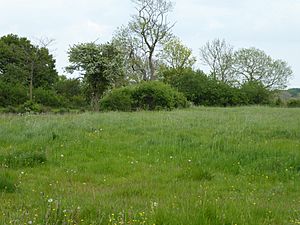Dew's Ponds facts for kids
| Site of Special Scientific Interest | |
 |
|
| Area of Search | Suffolk |
|---|---|
| Interest | Biological |
| Area | 6.7 hectares |
| Notification | 2000 |
| Location map | Magic Map |
Dew's Ponds is a special natural area in Suffolk, England. It covers about 6.7 hectares, which is roughly the size of nine football fields. This site is very important for nature.
It is known as a Site of Special Scientific Interest (SSSI). This means the government protects it because it has rare wildlife or geology. Dew's Ponds is also a Special Area of Conservation. This is an even higher level of protection for important habitats and species across Europe.
Contents
Why Dew's Ponds is Special
Dew's Ponds is a unique place with different types of natural areas. You can find grasslands, hedges, and ditches here. The ground is made of chalk, covered by a type of soil called boulder clay. This mix creates a perfect home for many creatures.
Home to Amazing Wildlife
The main reason Dew's Ponds is so important is its twelve ponds. These ponds are home to one of the largest groups of great crested newts in Britain. These newts are amphibians, meaning they live both in water and on land. They are protected because their numbers have dropped in many places.
Besides great crested newts, other interesting animals live here too. You might find grass snakes, which are non-venomous snakes that love to swim. There are also smooth newts, another type of newt, and slowworms. Slowworms are legless lizards that look like snakes but are actually lizards.
Protecting the Area
The site was officially recognized as a Site of Special Scientific Interest in the year 2000. This protection helps make sure the habitats and the animals living there stay safe. It means that any changes to the land must be carefully managed to avoid harming the wildlife.
Visiting Dew's Ponds
It's important to know that Dew's Ponds is on private land. This means there is no public access for visitors. The best way to help protect this special place is to respect its boundaries and allow the wildlife to thrive undisturbed.

